- Home
- Colm Toibin
The Heather Blazing Page 13
The Heather Blazing Read online
Page 13
“I couldn’t go to the technical school. They don’t do Latin in the technical school.”
“And what good will Latin be to you?”
“You have to have Latin to get into university.”
He pictured the technical school in Enniscorthy and the boys who went there, many from cottages on the outskirts of the town, others from rows of houses on the town’s edges, boys he knew to see but had never spoken to. When they left school most of them would go to England. He did not want to go to the technical school, no matter how different his aunt assured him it was from the technical school in Enniscorthy.
She put a paraffin oil heater into the parlour for him and let him pile his books up on the table.
“You’re a great scholar,” she said to him. “Your mother, God have mercy on her, was a great reader. She used to send to Dublin for books. We have a lot of books upstairs, your uncle’s father bought them years ago at an auction. You can take any of them you want.”
For a few hours in the day the house was quiet. He went through the books upstairs and carried a few down to the parlour. He recognized the names of some of the authors. There was mildew on a few of the books and a damp smell, but no one had opened them for years and the print was still legible. One day when the fumes from the paraffin had made him drowsy and he could study no longer he picked one of them up and began to read the opening page. He was puzzled by it, the unfamiliar was being described in too much detail. But he carried on, until he found a story to follow and learned how to skip the descriptive passages. He became engrossed in the story, the side plots and the cast of characters. Thereafter, he spent more time in the parlour reading the novels than studying his own texts.
When his cousins came home from school he had to do the farm work with them. He hated leaving his warm room and the intricate stories of the novels, but his aunt insisted that he must. He hated putting on Wellington boots and wading through the thick muck of the haggard. His two cousins took it for granted and had a keen interest in prices at the market and the cost of animal feed. They could not believe that he wanted to go to university. They wanted to leave school as soon as they could and make money for themselves.
After tea in the evening he played cards; he taught his three older cousins to play solo. They understood trumps because they had played twenty-five with their father, and soon they knew the rules of solo. They played at the kitchen table, as his aunt had ruled that only Eamon could use the parlour. The game was constantly interrupted by workmen and cattle dealers. His cousins began to play solo with as much skill and concentration as he did, and his aunt and uncle, after a few desultory attempts to join in the game, left them alone until it was bedtime, and then there was always trouble over how many more games could be played before the final chores of the evening and bed.
When the lambing season came the house changed: the boys could be woken at any time in the night and told to come and help. They did not go to school, but spent the day with the weaker lambs, or cleaning out sheds. Eamon stood shivering in the barn, watching the lambs, weak and slimy in the dim electric light. They were so small and frail, but within a day or two they were strong enough to be left in the fields with the sheep.
The days were getting longer; he noticed the pale light in the evening sky, but there was still no news. His presence was explained in the same way to anyone who came to the house: his Daddy was in hospital up in Dublin and he was here until his Daddy came home. And some other comment would be added like, “he’s after turning this house into a real card school” or “he’s a great scholar” or “we’ll make a farmer out of him yet.”
Jimmy Walsh often called into his aunt and uncle’s house; he had a cup of tea and talked about prices and neighbours and football matches. He told Eamon that he could come any time to try out the horse which Jimmy kept in a stable.
“There’s still great go in her,” Jimmy said as he looked up at Eamon and narrowed his eyes. “A bit of fresh air would do you good.”
* * *
It was a long walk to Walsh’s; the first afternoon he went there he thought that he had missed the turning. It took him almost an hour to reach the wooden ledge with the three milk churns he had been told about, and half an hour to walk down the lane, being careful to close each gate behind him, as he had been instructed to do. The house, when he came to it, looked desolate and damp. He went to the front door and rapped with his knuckles and then with his fist, but there was no sign of life. A sheepdog appeared and barked at him. When the dog came closer he patted its head. The dog wagged its tail and followed him as he went around to the back of the house. As he turned the corner the kitchen door opened and a girl a few years older than himself appeared. She was wearing an apron.
“Mr. Walsh said I was to have a try on the horse,” he said.
“I’m Anne,” she said and clipped her hair back. “I thought that you’d be younger.”
“I’m Eamon,” he said.
“What age are you?” she asked.
“I’m fourteen.”
“You look older. My uncle said that I was to saddle the horse for you and show you the ropes. He said that you were to have a cup of tea first.”
“Is Mr. Walsh your uncle?”
“Yes. I come down here every day and do for him.”
The kitchen was bare and cold. He sat at the table while she made tea.
“Do you have many brothers and sisters?” she asked.
“No. I’m an only child.”
“I have ten,” she said. “You can’t hear yourself talking in the house. It’s great down here.”
She put some soda bread and butter on the table, and sat with her elbows on the table.
“Is your father sick?” she asked.
“He had a turn.”
“And where’s your mother?”
“She’s dead,” he said and looked down.
“When did she die?”
“She died when I was a baby.”
“So there was just you and your father? What was it like with just the two of you?”
He hesitated. He did not know how to answer, but she continued to look at him without speaking, waiting for him to say something.
“I don’t know,” he said. “It was all right, I suppose.”
“You must miss your father now,” she said as she came back with the teapot and cups.
“Yes, I do,” he said and smiled at her as she watched him from across the table. It was the first time anyone had asked him about his father. He wanted to say something else. She poured the tea.
“I was with him in the cathedral when he had the turn. I was very frightened.”
She took off her apron and wiped her hands with a cloth. They walked out to an outhouse where the saddle was kept on a wide shelf beside the door. She told him to gather it up, and as he turned he noticed her breasts under her woollen pullover. He caught her eye as he averted his glance.
She opened a gate which led into a field full of thistles and closed the gate behind her. She was wearing a pleated tartan skirt. He noticed her waist, how slim she was. He liked the way she walked and her confidence as she spoke.
“You’d want to be careful,” she said, as they approached the horse in the adjoining field. “You could fall off and break your neck. The last man on this mare had a terrible fall,” she laughed. “Don’t mind me. I’m only joking. You looked so afraid.”
She told him to catch the mare and steady her. She threw the saddle across the mare’s back, ordering him all the while to hold her steady. Then she tied the saddle down.
“Watch her now,” she said. “She’ll kick.” He did not know whether she was serious or not.
She put the blinkers on and forced the bit into the horse’s mouth.
The saddle seemed much higher than he had imagined. “How do I get up?” he asked.
“Simple,” she said. “I’ll hold her and you put your hands on the saddle and lift yourself up. Fast now, fast.”
He tried it
a few times, but he fell back each time before he could get a chance to sit on the saddle. She grew impatient.
“Hold on to the reins here,” she said, “and I’ll show you.” When she did it she made it seem easy. He handed her the reins once more when she got down.
“You’re used to it,” he said, and tried again, but still could not jump into the saddle without unsteadying the horse.
“I’ll pull you up, the mare’s strong enough for both of us,” she said, and once more without any apparent effort she got up into the saddle. He held on to the saddle again with one hand and held her arm with the other.
“Don’t pull me down,” she shouted. “One, two, three, jump.”
This time he made it, and the horse remained steady; it took him some time to scramble around and sit on the back part of the saddle where she had made room for him. She patted the horse and held the reins.
“Hold on to me now,” she said. She gave the horse a kick with both her legs and the animal started to canter forward. After a while she made the mare slow down, keeping to the edge of the field, going round and round.
“The secret,” she turned to him and said, “is in your legs. You have to hold it with your legs.”
His penis was hard, and he tried to move back in the saddle so she would not feel it pressed against her, but each time the horse moved forward his body was thrown against hers. He was unsure what to do. He knew that she could feel it against her but she gave no sign. He wanted to put his hands on her breasts, but he felt a need also to get down off the horse without her noticing his reaction. He moved in closer to her, closing his eyes and forgetting his embarrassment. He was pressed tight against her, as the horse moved slowly around the field. She seemed oblivious to him. He held her tight around the waist. He could feel the comforting heat of her body as he pressed harder against her, he could feel his heart pounding and he caught his breath when he began to ejaculate. He felt a sudden sadness then, an urge to be away from her, an uneasy guilt which he had not known before.
He was glad to play solo again that evening, happy to be in the house with his cousins. He had changed his underpants and left the old ones behind a bush in the orchard to which no one ever went since the trees had all started to die. But as they played that evening he felt distant from the game, his mind kept wandering back to the scene earlier in the day.
In the morning when the others had gone to school he approached his aunt in the kitchen.
“Are you busy?” he asked her.
“Why, Eamon? What’s wrong with you?”
“I want to go home,” he said. “I want to be in my own house.”
“There’s no one to mind you at home.”
“But when am I going home?”
“I’ll be going up to Dublin next week and I’ll see your Daddy and we’ll settle it all.”
“I’ll write him a letter that you can take with you.”
“Of course I’ll take it up with me, but be careful not to worry him too much. It wouldn’t be good for him at all. And, listen, I was writing to all your aunts in America and telling them all about you, and they want you to write as well.”
“I wrote to them at Christmas,” he said.
“You should write to them more often. They love hearing news.”
* * *
He went back to Jimmy Walsh’s the following week. Once more, Jimmy was away at a mart and Anne was there alone.
“Your hair is different,” he said as they sat in the kitchen. “What did you do?”
“I knew you were coming,” she said.
“And is that why you did it?” he laughed.
“I don’t know what you’re laughing at.”
He had been worried about facing her again, afraid that she would mention what had happened between them. But she said nothing and he was relaxed now at the table in the kitchen.
“How’s your father?” she asked.
He did not know how to reply, but told her about his conversation with his aunt.
“Has he not written to you?” she asked.
“Yes,” he said, unsure what she meant.
“I don’t think you’re cut out for the saddle,” she said. “Maybe we’ll just take the horse for a walk.” She went to the shed and got the reins which she brought out to the field. They walked through a few fields with the horse in tow, moving slowly, the mare resisting the pull of the rein, until they reached a rutted lane with high ditches on either side. Eventually they came into an open field which sloped down towards a stream. Anne walked ahead of him, talking to the mare, coaxing her forward. The sky was low with clouds, but the rain kept off.
There were stones in the stream to make crossing easy. Anne let the mare drink and then led her across the stream and tied the reins to a tree, leaving enough rein for the mare to move around. They walked through a cluster of trees, until they came to a bank which was covered in undergrowth. Flies buzzed around them and there was a smell of damp earth.
“The ground is too wet to sit down on,” she said. “We should have brought a blanket.”
They both stood there; he kept his distance from her, still not sure why she had taken him here, not wanting to presume too much. She said nothing, but moved over towards a tree and rested her head against the bark. He moved towards her casually, pretending to be preoccupied. She smiled at him, and held out her hand. He had been thinking about her body, her breasts, her waist, her hair, but he had not noticed her lips before until he began to kiss her and taste her warm breath. She put her arms around him and opened her mouth wide so he could roll his tongue in against hers.
* * *
At home, he discovered that he could make his penis hard by concentrating on her mouth and her nipples which she had let him touch. He learned to masturbate. He brought half a sheet of newspaper upstairs, and while his cousins were asleep he worked at himself while he thought about her lips and her tongue, the lightness of her breasts and the warmth between her legs which she would not let him touch.
“You’re getting very fond of Jimmy Walsh’s,” his aunt said one day as they were all sitting around the table having tea.
“Maybe it’s the niece he’s fond of,” his uncle said. “She’s the one that’s getting the farm. Jimmy’s mad about her. She’d be a great catch, Eamon.” He laughed.
“Will you leave the child alone?” his aunt said. “He’ll have time enough for that.”
As the weather grew better he went to the Walshes’ as often as he could. Sometimes Anne was busy and he had to wait for her; often, they took the mare out and she taught him how to canter and gallop, but he did not learn easily. She asked him questions no one else had ever asked him, talked to him naturally as though he were an adult, and always, on each visit, he knew that she wanted to disappear into one of the outbuildings or to the thicket across the stream, just as much as he did.
She began to let him put his hand into her pants and explore between her legs. She gasped when he put his finger in, but he knew that he was not hurting her. He loved the soft wetness down there, and then the tight entry and he loved making her wince with pleasure. He was nervous the first time when she unbuttoned his trousers. He kissed her on the lips hoping that she would not want to look at him, but she persisted, put her hand into his underpants and held his penis.
He knew that what they did was a sin. As he walked home he knew that if he died, or if he had an accident, or his heart stopped, he would spend all eternity in hell. He would have to go to confession as soon as he could. The local curate, Father Moriarity, often came to his aunt and uncle’s house. He was a big, jovial man with a high-pitched laugh. He loved talking to the children. Eamon could not imagine trying to explain to him, even in the darkness of the confessional, what he and Anne had done together. He knew that Father Moriarity would have to keep what he was told a secret and he could not tell his aunt or Jimmy Walsh, but it would still be impossible to tell him. Until now, the state of mortal sin seemed unimaginable; now he was surprised at how
easy it was to study, or read, or eat meals without being disturbed by it. Only at night did the real impact of what he had done hit home.
On Sundays he went to communion with the rest of the family, and one Saturday, with his cousins, he went to the parish church for confession with Father Moriarity. Eamon told him that he had forgotten to say his night prayers, and Father Moriarity told him that God would forgive him if he said his penance. Before he said the Latin prayers Father Moriarity asked him if he was praying that his Daddy would be better and he said that he was. He was surprised that Father Moriarity was prepared to let him know that he recognized him. None of the priests in Enniscorthy had ever done that. He was even more certain now that he could not tell Father Moriarity about his sin. He would have to wait until he went home to Enniscorthy.
When the school holidays came, his cousins’ presence around the house made his reading impossible. He had to go and work with them on the farm. He became homesick again, as much for his daily routine as for Enniscorthy and his own house and his father. One of his cousins came to Walsh’s with him one day to try the mare. Eamon and Anne tried to hide in a shed, but they had only begun to kiss when they heard his cousin shouting their names outside in the yard and they knew it would be impossible and they would have to wait for another day.
One evening after tea, when they were getting ready to go out again and pick potatoes, his aunt told him that his father was at home, but he was still not well, and Eamon could go down soon to see him, but he would have to be very good.
“Can I go tomorrow?” he asked.
“I’ll see if your uncle is going into Tullow. If not, maybe someone else will be going in,” she said.
He packed his clothes and his books. He went downstairs and asked his uncle if he was going to Tullow, but his uncle said that he did not know. He asked his aunt again.
“I shouldn’t have told you until the morning,” she said.
Only when they had begun to play cards could he settle down and forget his lift to Tullow. That evening his aunt let them play until much later than usual. She said that his cousins could go and see him soon in Enniscorthy and they could play more solo there.

 The Magician
The Magician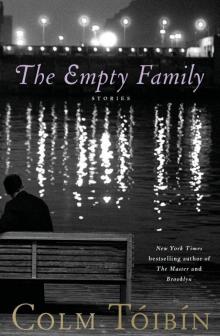 The Empty Family (v5)
The Empty Family (v5)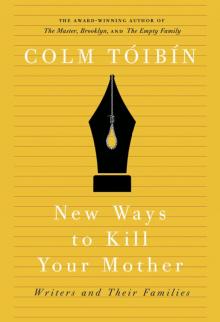 New Ways to Kill Your Mother
New Ways to Kill Your Mother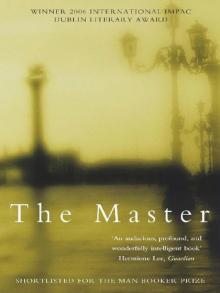 The Master
The Master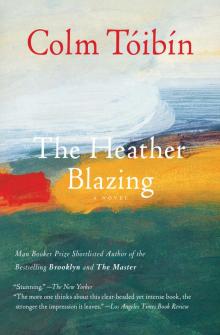 The Heather Blazing
The Heather Blazing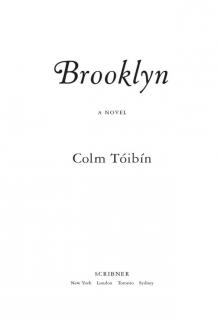 Brooklyn
Brooklyn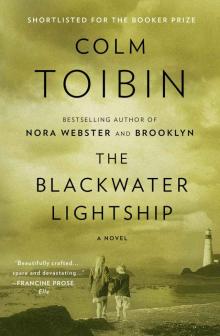 The Blackwater Lightship
The Blackwater Lightship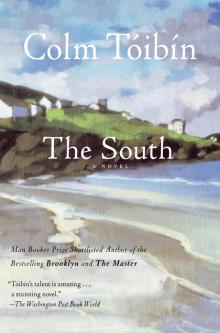 The South
The South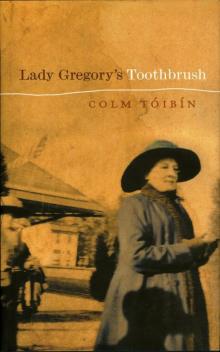 Lady Gregory's Toothbrush
Lady Gregory's Toothbrush House of Names
House of Names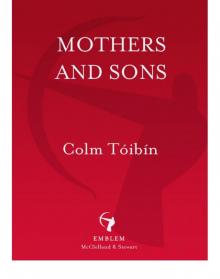 Mothers and Sons
Mothers and Sons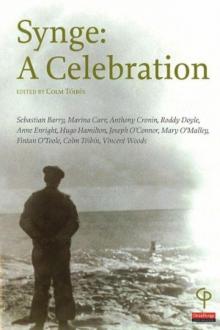 Synge
Synge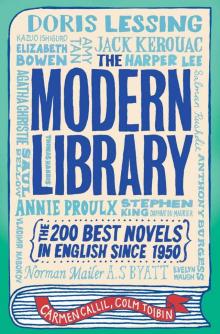 The Modern Library
The Modern Library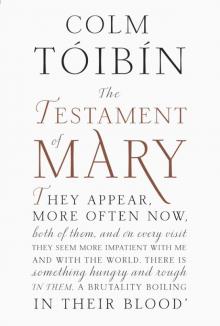 The Testament of Mary
The Testament of Mary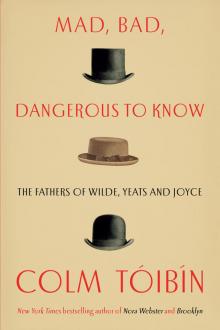 Mad, Bad, Dangerous to Know
Mad, Bad, Dangerous to Know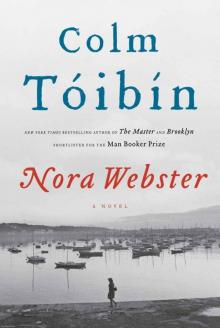 Nora Webster: A Novel
Nora Webster: A Novel